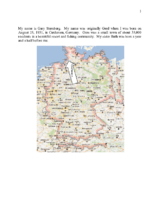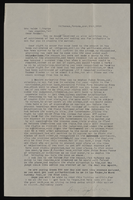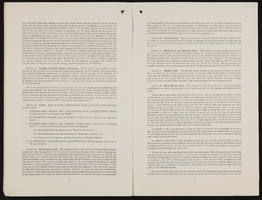Search the Special Collections and Archives Portal
Search Results
George Kelly Ryan Papers
Identifier
Abstract
The George Kelly Ryan papers (1921-1971) contain correspondence inquiring about Octavius Decatur "O. D." Gass, newspaper clippings from 1929, handwritten recollections of the Gold Ranch by Laura Royce, and a San Pedro, Los Angeles and Salt Lake Railroad Company information, including information on wash-outs in Nevada.
Archival Collection
Apolonio Sauceda Scrapbooks
Identifier
Abstract
The Apolonio Sauceda Scrapbooks (1973-2010) document Apolonio "Loney" Sauceda's acting career and his work with the Nevada Association for Latin Americans (NALA) in Las Vegas, Nevada. Two scrapbooks document Sauceda's career as an actor and contain photographs of Sauceda on set, at premieres, with other actors, and depict movie sets at well-known Las Vegas hotels and casinos in the 1980s and 1990s. Newspaper clippings accompany many of the photographs and provide details about locations, major actors, or the producers for each film. The third scrapbook is compiled of newspaper clippings that document the local Las Vegas, Nevada Latinx community and NALA events in the 1970s, ranging from political activism, labor strikes, beauty pageants, and religious gatherings.
Archival Collection
William J. Moore Jr. Photograph Collection
Identifier
Abstract
The William J. Moore Jr. Photograph Collection (approximately 1942-1960) consists of black-and-white photographic prints, negatives, and one oversize image depicting William "Bill" J. Moore Jr.'s career as a casino operator in Las Vegas, Nevada. Images include events at the Moore family home and the Hotel Last Frontier. Also included are images of Moore with politicians, casino operators, and other notable figures in Las Vegas.
Archival Collection

University of Nevada, Las Vegas (UNLV) Fall 2016 commencement program
Date
Archival Collection
Description
Commencement program from University of Nevada, Las Vegas Commencement Programs and Graduation Lists (UA-00115).
Text
Southern Nevada Jewish Heritage Project
"The goal of this 2014-2015 project is to build a web and mobile resource that will connect researchers from around the world to thousands of historical items—photographs, brochures, scrapbooks, letters, drawings, videos, and more—detailing the lives and contributions of Jews in Southern Nevada. It will include carefully researched biographies, timelines, and histories of institutions, events, and prominent themes showing the integral roles Jews have played in the history of Southern Nevada.
Corporate Body

Biographical essay by Gary Sternberg, 2014
Date
Archival Collection
Description
Gary Sternberg grew up in Germany, witnessing anti-Semitic propaganda as early as age 7. He describes some of the experiences his father endured at a concentration camp, and his escape to China. He and his mother reunited with his father in Shanghai in 1940. They left Shanghai in 1948, eventually settling in Cleveland. He and his family came to Las Vegas in 1969.
Text

Correspondence, Levi Syphus to Sadie George
Date
Archival Collection
Description
Text

Transcript of interview with Carl Ciliax by Gary Wood, March 8, 1980
Date
Archival Collection
Description
On March 8, 1980, Gary Wood interviewed Carl Ciliax (born 1941 in Las Vegas, Nevada) about his experiences living in Nevada. Ciliax first describes his family history, his early interests in wildlife, and his background and education in artwork. Ciliax then discusses his early experiences in hunting and his eventual interest in conservationism and preservation, including his involvement with organizations that sought the protection of desert bighorn sheep and the protection of wildlife in general. The two talk more about wildlife, the early development of Las Vegas, and the effects of the atomic testing. The interview concludes with Ciliax’s recollection of recreational activities and some of his thoughts on conservationism.
Text


